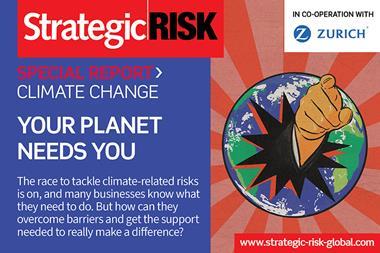Global CEOs and CFOs feel they have a lack of control over climate risk, even as 80% feel they should be held accountable, finds FM Global
Although the pandemic dominates the world’s attention, climate risk is simmering in the background, with more than three in four (77%) CEOs and CFOs at the largest companies in the world admitting their firms are not fully prepared for the adverse financial impact of a changing climate. Moreover, eight out of ten (82%) believe their companies have somewhat to no control over such an impact on their business.
The findings stem from a global survey of several hundred CEOs and CFOs at companies with $1 billion or more in revenue across a wide variety of industries in, Europe, North America, and Asia Pacific. The research was commissioned by FM Global and conducted by ENGINE Insights.
Three-quarters of respondents (76%) said their organisations are somewhat to significantly exposed to climate risk. Floods, droughts, and wildland fires topped the list as the three exposures that “concern their companies the most” and “could most negatively affect their financials.”
“These findings are concerning as more British businesses may potentially experience flood related losses in the coming years. Concerningly, the recent hot and dry weather that we’ve seen across Europe may exacerbate any flooding that does occur in the region. This could generate a monumental challenge for many businesses looking to deal with natural hazards like flooding alongside all the issues COVID-19 has already caused,” said Katherine Klosowski, vice president, manager, natural hazards and structures at FM Global.
“Unfortunately, these are difficult times for many companies, as they struggle with volatile financial markets and the threat of an economic recession, coupled with the fact that COVID-19 may create further challenges when preparing for natural hazards,” added Klosowski.
The survey results build upon the World Economic Forum’s report from earlier this year, released just before the pandemic struck, that declared extreme weather events plus failure of climate change mitigation and adaptation as top risks over the next 10 years.
“Fortunately, the majority of climate-related losses are preventable, highlighting the importance of building business resilience, particularly during the pandemic,” said Klosowski. “In the current crisis, achieving resilience may take more effort given the complexities caused by COVID-19, but it is possible. Lack of preparation could have a negative impact on already fragile bottom lines.”




















No comments yet